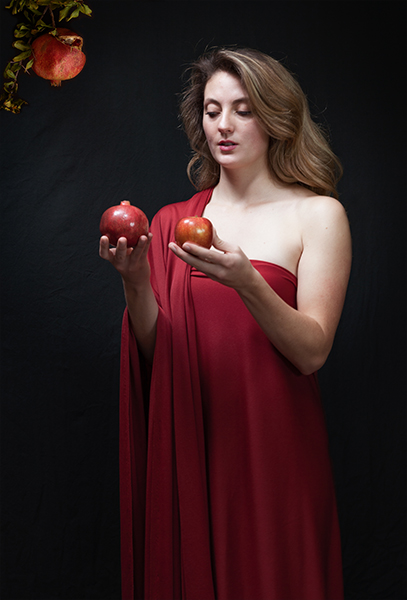Persephone’s Dilemma
Persephone’s dilemma: the pomegranate seeds. Many variations are found in different versions of the Persephone myth. All that I have seen so far agree that her father, Zeus, agreed to give her to his brother, Hades, without not just her consent but also without her knowledge. Just another example from the world’s literature of violence against women across time and space. That is how Persephone came to be in the Underworld in the first place: through the collusion of her father and uncle. Even I do not see how a young girl can fight that kind of strength against her. It is what it is, whether I like it or not. I cannot find a way in my mind to reinterpret that part of the myth.
After her mother, Demeter, in her grief and rage caused the Earth to go barren and be covered by Winter, Zeus worked out an agreement for Persephone to be allowed to return from the Underworld to Earth, bringing with her Spring and a return to life on the barren Earth. But, here is the hitch, at least for those of us who do not like Winter. While in the Underworld, Persephone had eaten some seeds of the pomegranate, binding her to her husband, Hades, with the requirement that she return to the Underworld for part of the year, during which time the Earth again experiences Winter. The time varies from three months to six months in different versions of the myth.
A major variation in different versions of the myth is how Persephone came to eat the pomegranate seeds in the first place. In some versions, she was tricked into it. In some versions she chose to eat the seeds, knowing full well the consequences. It was that variant that really got into my brain almost from the first day (September 15, 2015) I began to read the Persephone stories.
In my world, I do not see women as weak creatures who can be easily fooled. Over the years, studying copper miners’ wives as an anthropologist, or working with women as an obstetrican/gynecologist, I have seen women cope creatively and strongly with many different situations in which they found themselves, situations not of their own choosing. So, in my visual reinterpretation of the myth, I simply don’t buy that Persephone was tricked into eating the seeds.
Persephone had no choice initially about being in the Underworld with Hades. But in the various versions of the myth, she is not painted as being unhappy once she is there. Her mother, Demeter, is furious and grieving at the absence of her daughter, but that kind of feeling is not conveyed about Persephone, at least in the versions of the myth I have seen so far. In my visual painting of the myth, she chooses to eat the seeds, knowing she will be tied to Hades as wife, and that she will be required to spend part of her time in the Underworld. In some ways it actually reminds me a bit of Georgia O’Keeffe, who spent part of her time with her husband, and part of her time without him in New Mexico. I’ve always thought one of the better times in a former marriage was when we were commuting and seeing each other three days each month. It was very easy for me to see Persephone making the choice to eat the seeds.
Of course, in doing so, even though Demeter is the one who causes Winter to fall on the Earth, and that would never have happened if Zeus and Hades had not stolen her daughter (why don’t those two guys ever get blamed for Winter, anyway????????), it seems that in the end, Persephone bears much of the blame for Winter because she ate the seeds.
As I was thinking about that, and how I was going to present that visually, I couldn’t help thinking about another woman who brought grief to the world with another fruit, an apple: Eve and the Fruit of the Tree of Knowledge. BOOM! Thinking about those two together certainly got my brain going. Persephone and the pomegranate bring us Winter, and Eve and the apple got us kicked out of the Garden of Eden. I began to see things in terms of Woman, not just Persephone. Woman, blamed for all kinds of grief in the world. I decided to play with that visually.
Persephone weighing whether or not to eat the pomegranate seeds, knowing and accepting that she would be blamed for some human misery at Winter. This is Persephone’s dilemma:

Each Fall, she knew the time was approaching for her to return to the Underworld and we again see Persephone’s dilemma:

Persephone accepts responsibility for her choice. In today’s terminology, “she owns it.”

This myth presents such a rich tapestry to explore visually, and more chapters are to come. The next set will explore “what happens in the Underworld…” Stay tuned.



